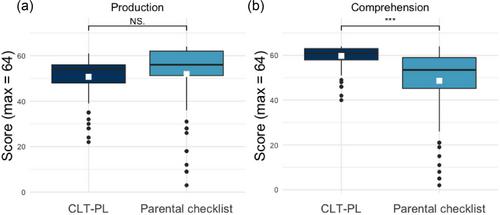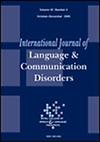Parental report of vocabulary in 3- to 6-year-old Polish children: Reliable but not valid
Abstract
Background
For over 30 years, parental reports have been used to study the vocabulary of children under 4 years of age. Research exploring parental checklists as a measure of vocabulary in older children is very limited. Typically, authors of parental checklists report the reliability of the developed tools but do not explore validity in terms of the agreement between parental assessments and the children's actual word knowledge.
Aims
We aimed to explore the reliability and validity of a parental checklist for assessing vocabulary in children aged between 3 and 6 years. Furthermore, we aimed to evaluate the agreement between indirect (parental checklist) and direct (picture naming and picture recognition tasks) assessments of children's vocabulary.
Methods and Procedures
A group of 94 typically developing monolingual Polish-speaking children aged between 3 and 6 years were first directly tested onsite with picture naming and picture recognition tasks (Cross-Linguistic Lexical Tasks). Subsequently, the participants’ parents completed an online checklist containing the same set of 128 items and marked all the words that they had ever heard in their child's spontaneous speech.
Outcomes and Results
The parental checklist demonstrated very high internal consistency. The scores of the parental checklist and vocabulary tasks were moderately correlated. We compared the total number of words marked by parents and the number of items correctly identified by children in the picture naming and picture recognition tasks. In picture naming, we found no difference between the children's scores and the number of words selected by parents. However, parents selected significantly fewer words than children correctly recognised in the picture recognition task. When data were analysed at the level of individual items (i.e., whether parents selected exactly the same items that children answered correctly), we found that the level of agreement was low. The level of agreement correlated negatively with the children's vocabulary; that is, the more words a child knew, the lower the agreement between the direct measure and the parental checklist.
Conclusions and Implications
Parental checklists should be used with caution in children aged between 3 and 6 years, especially if the assessed children have a large vocabulary and if item analysis is planned. Such checklists may be of more use in younger children or in children with limited vocabulary.
WHAT THIS PAPER ADDS
What is already known on the subject
- Parental checklists are commonly used to assess the vocabulary of children younger than 4 years of age. Previous research has indicated that parental checklists are reliable in terms of internal consistency and valid in terms of predictive and convergent validity.
What this paper adds to the existing knowledge
- This study introduces a parental checklist designed for assessing the vocabulary of monolingual Polish-speaking children aged between 3 and 6 years. Statistical analyses reveal that while the parental checklist exhibits high reliability, and the scores on the checklist correlate with direct measures of vocabulary, the agreement between parental reports and direct vocabulary measures (i.e., validity) is notably low, particularly when examining individual test items.
What are the clinical implications of this work?
- These findings underscore the importance of exercising caution when using parental vocabulary checklists with children aged between 3 and 6 years. These checklists can serve as a replacement for direct vocabulary tests only when the general/overall score is needed. However, when specific words are the subject of interest, parental reports may not be a valid measure.


 求助内容:
求助内容: 应助结果提醒方式:
应助结果提醒方式:


